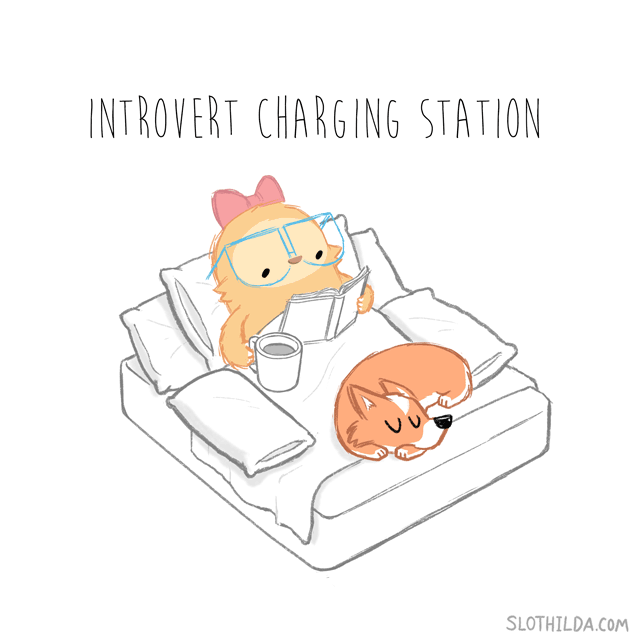FYP Letters is a series of non-curricular notes to keep us in touch over the next days and weeks. They are a combination of original writings and archival ones, including some re-printed FYP News items. — Dr. Susan Dodd, Interim FYP Director.
We were at the third of several holiday parties over one weekend when I caught my boyfriend–a bold, charismatic, belly-laughing extrovert–sitting alone on a couch looking at his phone. He was wearing his favourite conversation starter: a blue and yellow Hanukkah jumper with the star of David, dreidels, menorahs, little orthodox rabbis dancing, gold coins, and everything else that advertised ‘I love Challah-days’. It was as bright as his personality, and he loved talking about it. I haven’t been at a party where he didn’t make at least five or six new friends.
So seeing the jumper crumpled into a big screen-lit ball on the couch almost worried me. I went over and asked if he was okay: ‘Oh yes! I’m just peopled-out’. We stayed a little longer, I chatted to a few more glittery people, and went home. On the way, I told him I didn’t realise that even extroverts want to retreat into the fuzziness of sweatpants and silence and solitude.
There is an obvious connection between introvertedness and solitude. Being alone can be a powerful charging station, where we can cocoon ourselves away from all the stimulants of the outside world and become fully ourselves: safe, warm, unpretending.

For anyone who finds making conversation and meeting new people requiring effort, let alone downright difficult, coming home can feel like taking off a tight fitting dress, or a restricting suit. Sure, it’s fun to dress up, and it makes us feel like the ‘best’ version of ourselves, but we also know that is not the final version.
And yet even in the bustle of a crowd, we can be reminded of the loneliness we all feel. Looking at my boyfriend on the couch at that party immediately brought back memories of middle school: of every time I didn’t get invited to something, of all the times people were whispering but wouldn’t tell me about what, of every time I stood by myself. Of recess spent trying desperately to stand with the ‘cool girls’ in a circle, only to be kept, shoulder-to-shoulder, outside of it.
Feeling alone is not the same as being in solitude. That’s the difference between the two: loneliness hurts; solitude doesn’t.
Every time someone implies that we’re lonely, we tend to take it as a criticism. I, for one, worry that it makes me weak or pathetic or desperate. Being in a relationship out of loneliness seems like the wrong reason, because there’s work to be done: we need to learn to be with ourselves before we can be with others. When we act out of peer-pressure, it’s the fear of loneliness that grips us. The flash of a life with no one in it: the TV dinners and the 14 cats. There exists the belief that doing things out of loneliness is a human fault, when in fact it is a human default.
“The thirst for companionship, which drives us so often into error and adventure, indicates the intense loneliness from which we suffer. We are alone even with our friends. The smattering of understanding which a human being has to offer is not enough to satisfy our need of sympathy. Human eyes can see the foam, but not the seething at the bottom. In the hour of greatest agony we are alone.” – Abraham Joshua Heschel
We are programmed to be lonely. Various religions and philosophers have explored this dilemma of our nature. In Judaism, loneliness is a reflection of God: God is ‘programmed’ to love man, in the sense that he needs to love us. The idea of the divine being lacking in any ways seems heretical, but helps explain creation. God needed man; man needed woman; woman needed puppy. And so on.
Being innately lonely makes us innately communal creatures. If we weren’t, we’d always be satisfied without others. We need to feel lonely to make connections, to commune, to coexist.
It’s a question of how we address that loneliness, and where it leads us that is the problem.
There are many ways to be lonely, and acting out of it usually, and ironically, results in more loneliness. We settle for the friend who is abusive, stay in relationships that have long fizzled out for way too long, or attend mediocre parties, numb out with smartphones, drugs, alcohol and sex. We feel detached, misunderstood, and profoundly alone. Not even that puppy helps. We are filled with longing.
The relationship between loneliness and longing is one that has to do with desire, or eros. What is this longing, and what is it that we long for?
In a world where mindfulness and non-religious spirituality are on the rise, it makes sense to think about our relationship to the divine. And if there’s no divine, to the collective human nature. Mindfulness is a tool to bring awareness of our immediate surroundings: to see, hear, and appreciate the fact that when we are alone, we are still okay. It teaches us to be with ourselves before we tune out the painful yearning with our devices.
This desire for belonging is at the root of our need for each other, and if we deny the divine, we can at least believe in the interconnectedness of all things. Hence why we can forge relationships with dogs, or cows, or even our pet turtle. It’s why Instagram ‘Pet Influencers’ and The Dogoist are a thing. And it’s also why, when overwhelmed at a party, we can sit comfortably on our own without having to re-experience our earlier traumas.

